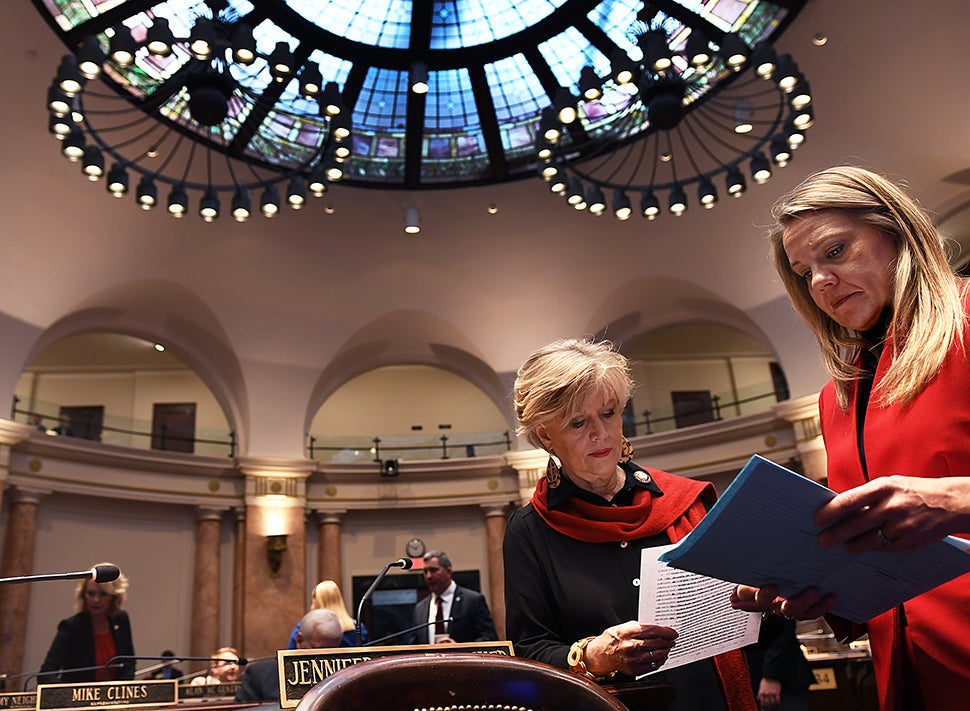Third anti-DEI bill filed as local groups respond
Published 1:13 pm Wednesday, January 24, 2024

- Rep. Jennifer Decker, R-Waddy, (left), and Rep. Emily Callaway, R-Louisville, look over legislation before the start of the House session on Jan. 10.
FRANKFORT — Friday, a third bill targeting diversity, equity and inclusion in Kentucky schools was filed.
House Bill 9, sponsored by Rep. Jennifer Decker, R-Waddy, would essentially ban DEI efforts in Kentucky’s public universities and colleges.
The first anti-DEI bill filed, Senate Bill 6, involves a number of so-called “divisive concepts,” including the concept of systemic inequality and inherent privilege based on race or sex.
The bill, sponsored by Sen. Mike Wilson, R-Bowling Green, would ban public colleges and universities from asking current or prospective student or employees about their support or opposition to any of the divisive concepts listed in the bill.
It would also prohibit mandatory trainings that include any of the concepts.
Senate Bill 93 would ban local school districts from advocating for diversity, equity, inclusion and belonging.
It also removes the current requirement for schools to adopt a “trauma-informed approach” to education.
That current approach includes creating a space for students to feel safe and supported to learn with the recognition that students’ learning may be significantly impacted by any trauma they have experienced.
What’s in the bill?
The newest bill, House Bill 9, defines diversity, equity and inclusion initiatives as policies, practices or procedures intended to provide differential treatment or benefits to someone based on religion, race, sex, color or national origin.
Decker’s bill would ban postsecondary institutions from using any money, facilities, social media and webpages, faculty or staff to create or maintain a DEI office, hire DEI officers, provide DEI trainings or establish any DEI initiatives.
Additionally, none of these resources could be used to promote “discriminatory concepts,” concepts that justify or promote differential treatment based on religion, race, sex, color or national origin.
Discriminatory concepts also includes presenting systemic inequality — the concept that power structures or systems persist “on the basis of oppression, colonialism, socioeconomic status, religion, race, sex, color or national origin” — as objective truth, rather than something up for debate.
The bill states that these limitations would not impact the academic or religious freedom of faculty, students or student-led organizations, or ban initiatives required to comply with federal law and preexisting contracts.
Under the bill, institutions would also not be able to “manipulate or influence the composition of the student body,” prioritize contracts and vendors, impose scholarship criteria or make student housing assignments on the basis of religion, race, sex, color or national origin.
There is an exception that would allow institutions to use biological sex for the purpose of single-sex housing assignments.
If prospective students talk about their religion, race, sex, color or national origin in their application process, universities would not be able to provide differential treatment based on their statement.
Credit earned from courses that are dedicated to promoting or justifying “discriminatory concepts” or diversity, equity and inclusion initiatives would not count toward graduation credits.
Finally, the bill would have all students and employees of Kentucky’s public colleges and universities fill out an annual survey.
The survey would look at their level of exposure to a variety of ideological and political perspectives, as well as how comfortable they feel expressing their viewpoints on campus.
The Council on Postsecondary Education would then post the results on its website.
The bill has not yet been assigned a committee.
Local reaction
Leslie McCoy, spokesperson for Bowling Green Independent School District, said that they are following House Bill 9, and that Superintendent Gary Fields will be prepared to testify if it makes it to a committee.
“Overall, Bowling Green Independent Schools are preparing students to be excellent citizens, employees, and future leaders, both locally and globally,” McCoy said in a statement.
“Preparing students for success goes beyond classroom requirements and means identifying and addressing inequities, as well as supporting a welcoming and inclusive school community.”
WKU spokesperson Jace Lux and UK spokesperson Jay Blanton also said that their respective universities were monitoring all the DEI legislation, and are both committed to providing an environment where students, faculty and staff feel that they belong.
Bowling Green/Warren County NAACP President Ryan Dearbone said that his organization strongly opposes the proposed legislation.
He said that the bills are set to “dismantle DEI” based on a false narrative that DEI and the theories that accompany it are divisive.
“The thing that I think a lot of people don’t realize is minorities are not asking for a step ahead of somebody,” Dearbone said.
“We’re not asking you to give us something extra that you didn’t give to somebody else. A lot of times, it’s simply asking to be given the same things that everybody has, the same opportunities.”
Dearbone said that lawmakers have a “tone deafness” about the true meaning of diversity, equity and inclusion.
He is concerned about Kentucky kids if SB93 passes. He said that when they enter more diverse environments in adulthood after a lack of diversity education through high school, they will be”doomed to failures of communication, of understanding what true diversity is.”
Dearbone added that fears of “indoctrination” or “wokeness” in Kentucky schools are unfounded. While students get “small nuggets” of diverse education, they aren’t being “overly saturated with it.”
Ultimately, Dearbone thinks the message from Republican state lawmakers is clear.
“They may try to window dress it, but ultimately they don’t want diversity,” he said. “They don’t want equity. They don’t want inclusion. They want to whitewash history.”





